I'm just back from a lovely few days in Bahrain. I was there as a guest of the Bahraini eGovernment Authority, who had asked me to speak at the Bahrain International eGovernment Forum.
It was an interesting conference, on a topic that I don't normally have much dealing with. I was there to provide some information on the emerging topic of the Internet of Things (naturally).
Read on for the slides and notes for the talk.
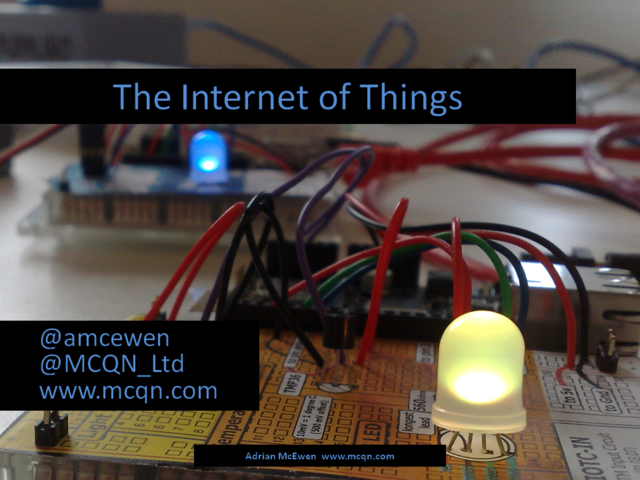
Thanks for inviting me here to speak today.
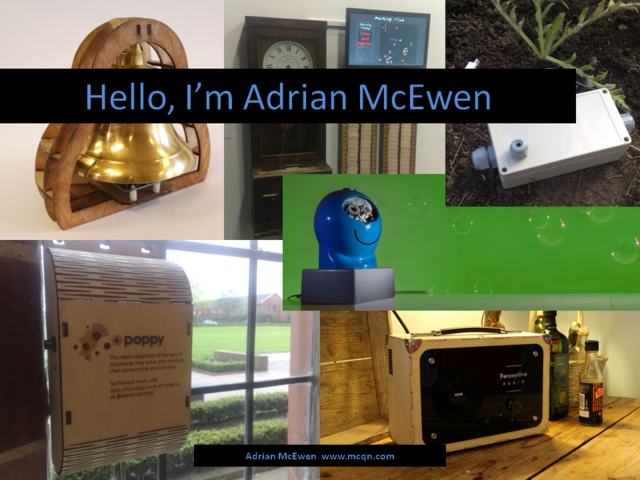
I'm Adrian McEwen, a technologist and artist. I run MCQN Ltd, an Internet of Things agency. We make things like the ones pictured here (and other less photogenic work)...
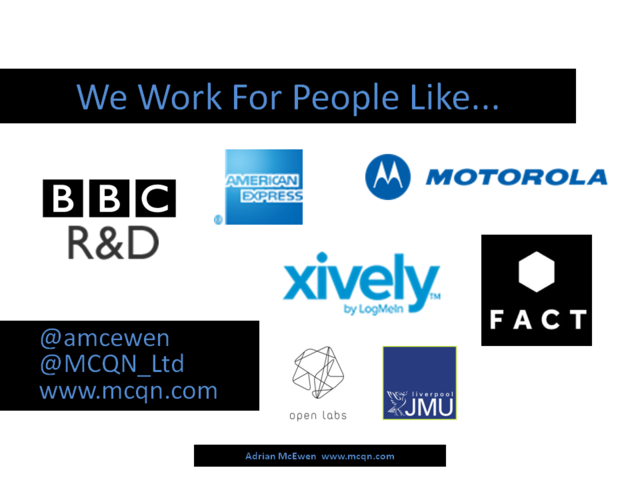
...for people like these (and other, less well-known ones).
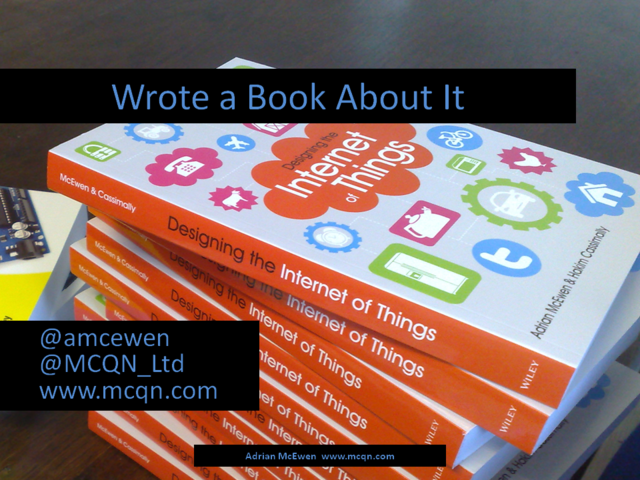
I've also written a book about it, Designing the Internet of Things, which was published by Wiley last year.
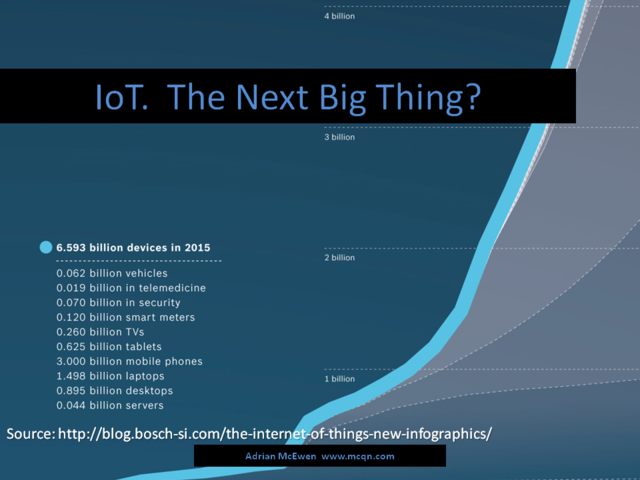
By now, I imagine a fair few of you will have encountered the term "the Internet of Things". It's the sort of thing that has the analysts competing to see who can claim the biggest number of devices that will be online by 2020 or 2030 or whenever.
But that's missing a lot of the point. What is it?
I like to call it the third wave of the Internet. First we connected all the computers; then all the mobile phones; now we're connecting everything else.
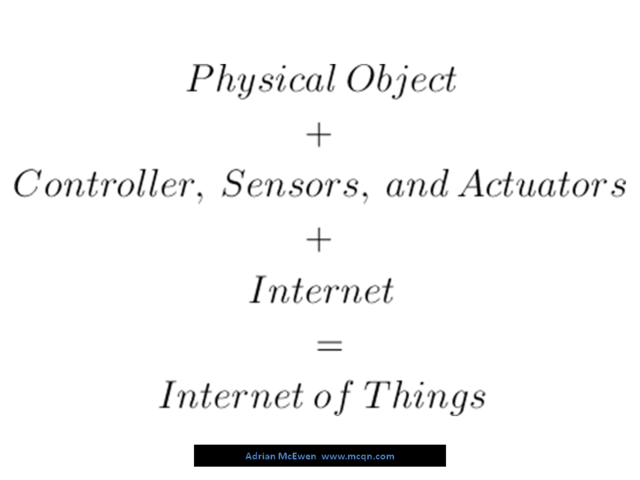
In the book, we defined it like this. Physical object (or Thing), plus some computing power and electronics - sensors and/or actuators - plus connectivity.
We're getting closer, but that's still a little dry and factual.
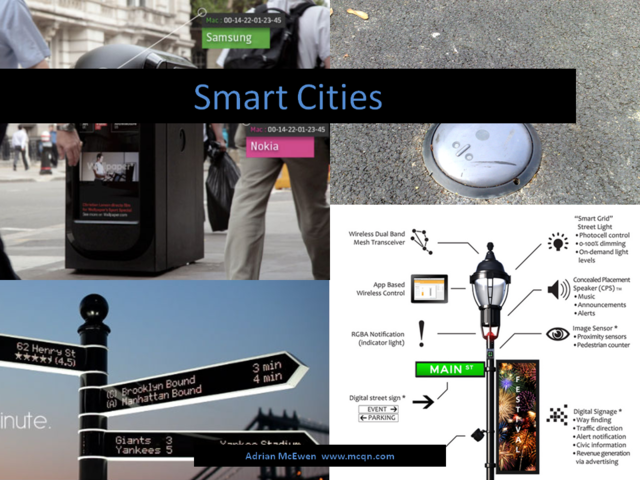
It's what lets us build smart cities - with intelligent street lighting, network-updateable screens on bins, parking sensors and real-time signpost information.
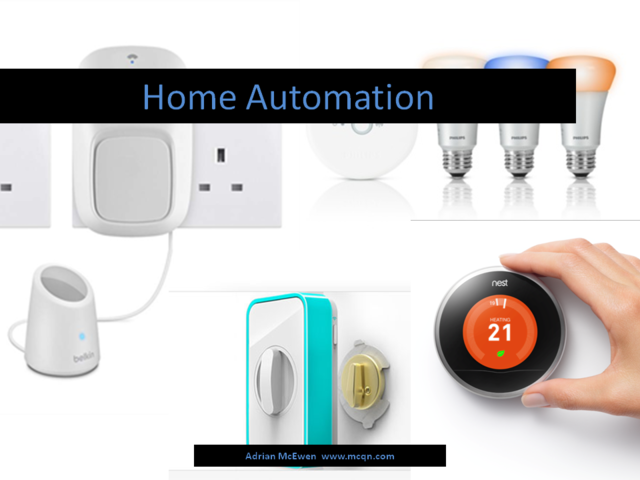
It's finally making home automation a reality - whether through Nest smart thermostats, phone-enabled door locks or plug sockets with a software API to hook them up to whatever Internet service you like.
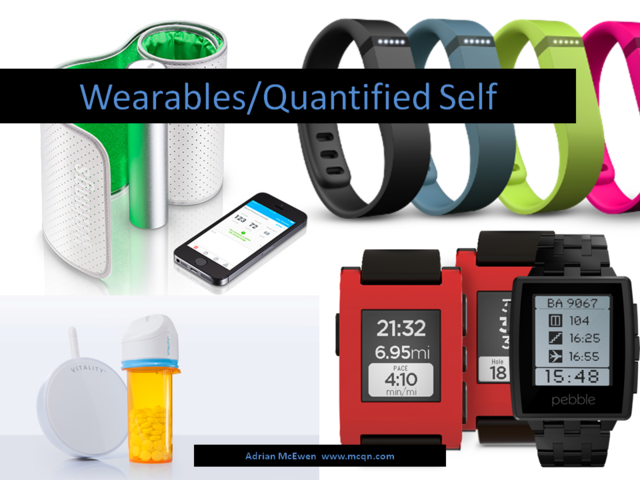
You can see it in the growing number of companion devices to help manage our well-being. The smart watches that talk to your phone, or the pill bottles that know whether or not you've taken your medicine and glow if you've forgotten (before escalating the alert to a phone call to you, or a loved one or your doctor if it continues)

Naturally, business is exploring how to use it to increase efficiency and monitor important parts of their supply chain. Monitoring growing conditions on the farm; ensuring shipments don't exceed their temperature or humidity parameters or stray from their expected route; or bringing the Facebook profile of fashion items and their number of Likes out onto the shop floor in real time.

It's also throwing up new classes of device entirely (although this is just the beginning). Items that live in your home and provide a little networked printer to give you snippets of personalised content; lamps that let you stay in touch with loved ones, wherever they are in the world just through knowing if their lamp is on or not; or bubble machines that are triggered whenever you're mentioned on Twitter.

It's an exciting time, but there are some challenges to overcome.
Building hardware is hard, and the VC world hasn't quite got its head around companies that are building physical objects just yet. It needs a longer-term view than your typical software play, but the opportunities are huge.
There are also areas where government may be able to assist. Or at least where they should keep a watchful eye.

One of the common calls is actually a red herring. Many big IT firms and academics are calling for new protocols that unify all of the disparate areas of the Internet of Things.
That's a waste of everyone's time. Almost all of the protocols that we need are already in widespread use on the rest of the Internet.
There are a few niches where we need different protocols, but even there, many of them already exist in some form or other: MQTT, CoAP, 6LoWPAN.
There will be areas like device management, where we might need additional protocols and interoperability, but these will mesh with other existing technology and should be based on real, identified needs that emerge as we deploy the systems. They'll also likely take slightly different forms depending on where they'll be deployed. The system in your car will work differently from the system for your pacemaker.
When, or if, government gets involved in such efforts, it should be to encourage an open approach - to maximise the chance of devices from different vendors working together, rather than locking us into the IoT equivalent of the Apple vs Android app store.

The big issue around governance in the Internet of Things is with trust, privacy and security.
As more and more sensors are deployed and hooked up to the network, citizens need to know what is happening to all that data. At the moment the costs of such technology often fall on those who happen to encounter it, rather than on whoever has deployed or owns the devices. In many cases it's not yet clear that those costs are worth society bearing.
People need to be able to trust what the devices are doing, if we're to realise the potential for the Internet of Things. Right now that's not a given. Public trust in corporations is at a real low, and in the US and UK at least, trust in the media or in the Government isn't any higher.
It's going to take hard work to rebuild that trust.
But we need to, if we're going to answer the questions about who owns the data that's collected. If a camera on an advertising hoarding in the street profiles me, who owns that - is it me, as the person being profiled? Or is it the company who installed the camera? Or the company whose software takes the captured images and performs software analysis to provide the additional "value"?
Do I have the right to know what information is being gathered about me? Do I have the right to prevent people from gathering information on me in public? How detailed is the information that companies or governments are allowed to gather?
The answers to these questions are far from clear, and it would be good for government to be helping lead the discussion about it.

And I think that shows the way forward.
There's huge potential in the Internet of Things, but some significant hurdles to overcome too.
If we can find ways for people, companies and governments to collaborate in designing secure and interoperable systems, then there's a chance we'll realise the potential.

Thank you. I'd be happy to discuss it more, so if you've got any questions, or if you'd like to chat about it - grab me afterwards or drop me an email.
